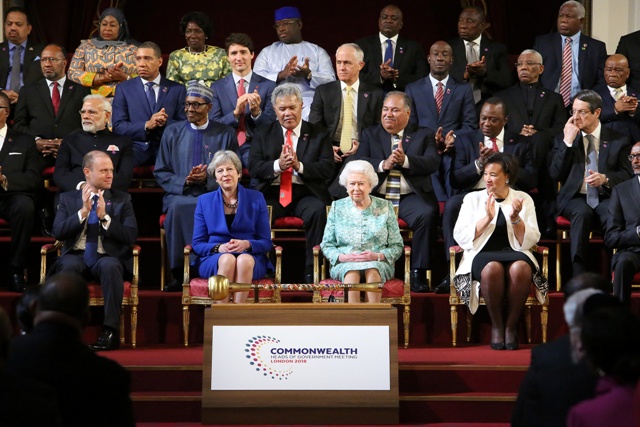 The opening of the Commonwealth Heads of Government Meeting at Buckingham Palace [photo: Commonwealth 2018 official photos on Flikr]
The opening of the Commonwealth Heads of Government Meeting at Buckingham Palace [photo: Commonwealth 2018 official photos on Flikr]
So how was it really? The London CHOGM had pomp and ceremony on an unprecedented scale, quite different from the Edinburgh CHOGM of 1997, or the London CHOGM of 1977. Those who take a close interest in the Commonwealth judged it a success. Its media critics had a go at it in the run-up, but were mostly silent during and afterwards – apart from some noisy pro- and anti-Modi demonstrations in Parliament Square. Less certain is what the lasting impact will be.
It is useful to reflect on those previous summits in the United Kingdom. The 1977 gathering, chaired by James Callaghan, is remembered for two decisions in particular: the Gleneagles agreement, which directed the Commonwealth boycott of white South African sport during the apartheid struggle, and the decision to criticise the despotism of Idi Amin in Uganda, because of his abuse of human rights.
The 1997 event in Edinburgh, with its statement on trade which had remarkably little effect, is remembered as Tony Blair’s “Cool Britannia” moment. The Labour government he led for the next decade had only an erratic interest in the Commonwealth, focused chiefly on Africa where he quarrelled with Mugabe in Zimbabwe, sought to re-establish democracy in Sierra Leone, and mounted a prestigious Africa Commission. By putting the Queen on the stage in Edinburgh he helped the British monarchy, after the traumatic death of Princess Diana, and the event saw the first flourish of civil society, in a series of events stimulated by the Royal Commonwealth Society.
This time there were a raft of announcements, so many that it was difficult even for close observers to evaluate what is really going to happen afterwards. For example one of the most eye-catching relates to the Blue Charter, in which for example the UK and Vanuatu are joint champions of a Commonwealth drive to clean plastic litter from the oceans. Elsewhere the Commonwealth acknowledged a new centre for countering violent extremism in Cameroon, a country which had been on the edge of the agenda for the Commonwealth Ministerial Action Group because of a government crackdown on Anglophone separatism. It was hard to see where the multilateral Commonwealth was acting, or where it was just an umbrella for national initiatives.
But three results stand out. The first was the final paragraph of the short statement from leaders: “We are committed to a stronger Commonwealth Secretariat, including through sustainable financing.” This was an overdue statement, given the rundown in Secretariat staff and its development budget, the Commonwealth Fund for Technical Cooperation. The Secretariat has had a rocky time lately, not eased when it lost a well-publicised employment tribunal.
The second, to which the media gave much of its attention, was the decision to recognise Prince Charles as Head-of-the-Commonwealth-in-waiting. Not until the last decade has the Prince shown much interest in the Commonwealth, but the decision was seen not only as a tribute to the constant service of the Queen, but as a way of hooking the British into continuing support for the organisation. Until very recently the UK government has been cutting Commonwealth budgets, where it had been talking of cutting its annual subscription from 31% to 25%, and this CHOGM signalled a reversal.
And the third outcome, which may prove problematic, was the decision to award the 2020 CHOGM to Rwanda. The government of President Kagame has been strongly criticised on grounds of lack of democracy, evidence of targeted assassination of opponents, and human rights abuse. Having changed the constitution to permit him a third 7-year term, Kagame was elected last August by 99% of voters in a 98% turnout. But Rwanda has its admirers for its reconciliation after genocide, its economic development, its superb conference facilities, and its 5G internet. There will be controversy.
So will the UK, as Chair-in-office until 2020, be any more active than Malta was from 2015 to 2018, or Sri Lanka from 2013-2015? With all the Brexit concerns assailing Prime Minister May, and dispersal of the large CHOGM task force assembled for the summit, no one should bet on it.
Richard Bourne is a member of the Round Table Editorial Board.
Related articles
Round Table Chair Victoria Schofield shares her views during CHOGM Week
What the media has been saying about CHOGM 2018
Leaders say the Commonwealth is more relevant than ever – Commonwealth Secretariat



